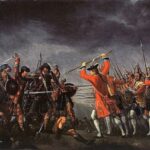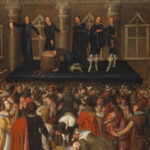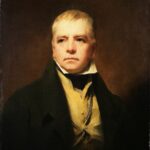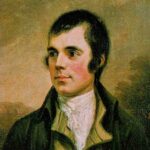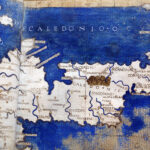James Hogg (1770–1835): The Ettrick Shepherd and the Dark Soul of Scottish Romanticism
Introduction
James Hogg (1770–1835), known as the “Ettrick Shepherd,” occupies a curious and often underestimated position in Scottish literary history. A self-taught shepherd from the Scottish Borders, Hogg emerged as one of the most original voices of the Scottish Romantic era. His literary career was marked by contradiction: though he was deeply immersed in the rural traditions of the Borders, his greatest work, The Private Memoirs and Confessions of a Justified Sinner (1824), was a psychologically complex and profoundly unsettling exploration of religious fanaticism and the duality of human nature. Hogg’s writing combined folk traditions with literary sophistication, blending supernatural elements with philosophical depth. Despite his literary achievements, Hogg struggled for acceptance within the literary establishment, often overshadowed by his contemporaries Sir Walter Scott and Lord Byron. His rise was marked by resilience and self-reliance, but his career was tempered by financial instability and critical neglect. This essay explores Hogg’s life and works, his rise from shepherd to literary figure, the challenges he faced, and the legacy he left behind in both Scottish literature and the wider Romantic tradition.
I. Early Life and Literary Awakening
James Hogg was born on 9 January 1770 in Ettrick, a remote valley in the Scottish Borders. His family were shepherds, and Hogg’s early life was one of poverty and hardship. His formal education was limited; he attended a village school for only a few months, and his reading material consisted largely of the Bible, traditional ballads, and chapbooks.
In his early teens, Hogg began working as a farm laborer and later as a shepherd. Despite his lack of formal education, he demonstrated an extraordinary gift for memory and language. Hogg memorized long passages from the Bible and Scottish ballads, and his exposure to the oral storytelling traditions of the Borders profoundly shaped his literary voice.
“Hogg was a product of the land,” wrote historian David Groves. “The rhythms of his verse reflect the cadences of the Border ballads and the harsh realities of rural life” (Groves, 1992).
Hogg’s early poetic inspirations came from reading Robert Burns, whose works demonstrated that working-class Scots could achieve literary greatness. Burns’ ability to elevate Scots dialect and rural themes into high art emboldened Hogg to develop his own poetic style.
In 1796, Hogg published his first poem, The Mistakes of a Night, in a local newspaper. Encouraged by the response, he began composing longer works. His first collection, Scottish Pastorals (1801), introduced him as a promising new voice in Scottish poetry.
II. Rise to Prominence: Poetry and Patronage
Hogg’s rise to literary prominence was closely linked to his relationship with Sir Walter Scott. In 1801, Scott began collecting material for his anthology Minstrelsy of the Scottish Border, and Hogg provided him with several ballads he had learned from oral tradition.
Scott’s recognition of Hogg’s contributions elevated his status within the Scottish literary community. In 1807, Hogg published The Mountain Bard, a collection of ballads drawn from Border folklore, which brought him wider recognition. The success of The Mountain Bard allowed Hogg to purchase a small farm in the Yarrow Valley.
Despite this success, Hogg’s financial position remained precarious. His attempts to establish himself as a sheep farmer failed, and he faced recurrent debt. Nevertheless, he continued to write prolifically, producing volumes of poetry and essays that explored themes of rural life, religious faith, and Scottish identity.
In 1810, Hogg published The Forest Minstrel, a collection of poems that established him as a major figure in Scottish poetry. His work was characterized by a fusion of folk traditions and romantic imagination. Historian John Carey observed, “Hogg was not simply a collector of folk traditions; he was a mediator between oral culture and the printed word” (Carey, 1985).
During this period, Hogg became part of Edinburgh’s literary elite, mixing with figures such as John Wilson and William Blackwood, founder of Blackwood’s Edinburgh Magazine. Despite his increasing literary status, Hogg remained something of an outsider. His rural background and lack of formal education set him apart from the more refined intellectual circles of Edinburgh.
III. The Masterpiece: The Private Memoirs and Confessions of a Justified Sinner (1824)
Hogg’s literary masterpiece, The Private Memoirs and Confessions of a Justified Sinner, was published in 1824. A chilling exploration of religious fanaticism and psychological fragmentation, the novel was unlike anything in Scottish literature.
The novel tells the story of Robert Wringhim, a young Calvinist who becomes convinced that he is among the “elect” and, therefore, justified in committing murder. The narrative shifts between a third-person account and Wringhim’s own “confession,” creating a layered and unsettling examination of moral certainty and psychological instability.
The work explores Scotland’s complex religious history and the influence of Calvinism, which taught that salvation was preordained. Hogg presents the terrifying implications of such theological rigidity—if salvation is predetermined, then moral accountability becomes meaningless.
“The Justified Sinner is a psychological case study of Calvinist determinism turned to madness,” wrote literary critic Marilyn Butler. “Hogg’s genius lay in his ability to depict the unraveling of human reason beneath the weight of religious dogma” (Butler, 1979).
The novel’s reception was mixed. While some recognized its originality, others found its themes disturbing and its structure confusing. The book was largely ignored by the mainstream literary establishment, and Hogg’s reputation as a poet and storyteller remained greater than his standing as a novelist.
IV. Later Life and Challenges
Despite the brilliance of The Justified Sinner, Hogg’s later years were marked by financial difficulties and professional frustration. He continued to publish poetry and short fiction, but he struggled to secure consistent patronage.
Hogg remained a respected figure in Scottish literary circles, but his relationship with Sir Walter Scott became strained in the 1820s. Scott’s conservative political views and growing closeness to the British establishment clashed with Hogg’s more radical, rural outlook.
Hogg’s final years were marked by declining health and financial insecurity. He died at his farm in Altrive in November 1835, aged 65.
V. Legacy and Cultural Impact
Hogg’s literary reputation underwent a significant reassessment in the 20th century. The Justified Sinner was rediscovered by modernist writers and critics, who recognized its psychological complexity and narrative experimentation. The novel is now regarded as one of the most important works of 19th-century Scottish literature.
- His influence on Scottish literature is profound. His blending of supernatural themes with psychological insight influenced writers such as Robert Louis Stevenson and James Joyce.
- His use of Scots dialect and folk themes established a foundation for modern Scottish literature.
- His exploration of religious fanaticism and moral ambiguity anticipated key themes in modernist fiction.
“Hogg’s genius lay in his ability to straddle the boundary between tradition and innovation,” wrote Ian Duncan. “He drew from the ancient ballads of the Borders and shaped them into a modern form of psychological and philosophical fiction” (Duncan, 2005).
Today, Hogg’s works are studied not only for their literary merit but also for their insight into Scottish identity, religious culture, and the tensions between modernity and tradition.
VI. Conclusion
James Hogg’s life and work reflect the contradictions of early 19th-century Scotland—a nation rooted in rural tradition yet grappling with the forces of Enlightenment and modernity. His journey from shepherd to literary figure speaks to the transformative power of language and imagination. His poetry elevated the voices of the Scottish countryside, while The Private Memoirs and Confessions of a Justified Sinner remains a haunting exploration of moral certainty and psychological terror. Hogg’s legacy endures not only in the pages of his work but also in the cultural memory of Scotland, where the Ettrick Shepherd’s voice still echoes across the Borders.
References
- Carey, J. (1985). The Scottish Enlightenment and Its Critics. Edinburgh University Press.
- Butler, M. (1979). Romantics, Rebels, and Reactionaries. Oxford University Press.
- Duncan, I. (2005). Modernism and Scottish Literature. Cambridge University Press.
- Groves, D. (1992). Scottish Ballads and Narrative Poetry. Oxford University Press.

